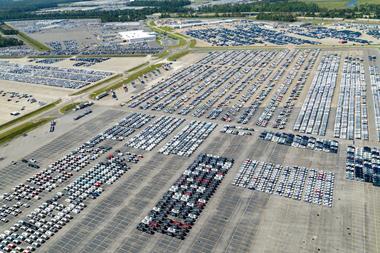 David Davis, the UK’s Secretary of State for Exiting the European Union (pictured, left), has met with leaders of the UK automotive sector to discuss the car sector’s priorities as the UK heads towards the start of negotiations over its departure from the EU.
David Davis, the UK’s Secretary of State for Exiting the European Union (pictured, left), has met with leaders of the UK automotive sector to discuss the car sector’s priorities as the UK heads towards the start of negotiations over its departure from the EU.
Monday’s event, organised by the Department for Exiting the EU (DXEU) and hosted by the Society of Motor Manufacturers and Traders (SMMT), aimed to “support the government’s understanding of the issues and opportunities faced by the auto industry as part of Brexit,” according to a statement from Aston Martin, which had representatives at the meeting.
It was held under Chatham House rules so the details of what was discussed have so far been kept private.
"As the UK exits the EU, we are determined that our country remains a great place to invest and to do business. We want the best deal for trade in UK goods and services, including for our important automotive sector," said Davis in a statement following the meeting.
The automotive sector is the UK’s largest manufacturing export sector. In 2015, it employed 169,000 people in automotive manufacturing, exported 1.2m cars and generated £34.3 billion (US$43.5 billion) in export revenue.
Davis was joined at the roundtable by other government leaders including the climate change and industry minister Nick Hurd, and transport minister John Hayes, along with representatives from the major carmakers and other well-known automotive industry companies.
SMMT chief executive, Mike Hawes (pictured, right) was also present, and said: “Today’s discussions were a good opportunity to meet with government to reinforce the success and importance of UK Automotive, and to highlight the specific priorities for our sector when leaving the European Union.”
The industry representative body recently estimated that tariffs on imported and exported finished vehicles could amount to £4.5 billion a year, if Britain makes a clean break from the EU.
Under a ‘hard’ Brexit scenario, World Trade Organization (WTO) tariffs would apply to imports and exports between the UK and Europe by default until new deals were negotiated and in force.
The SMMT estimates this 10% WTO tariff would total £1.8 billion per year for the UK’s car exports and £2.7 billion for imports.
Hawes added: “Being part of the single market has helped make the UK automotive sector amongst the most competitive in the world and a critical part of the UK economy.
“It is essential that we maintain those benefits and we will work with government and our partners in Europe to ensure the global success of our sector continues in the future.”
In October, The UK government laid out a timetable for exiting the EU, which may come as early as the first quarter of 2019. Negotiations are expected to begin once the country triggers Article 50, expected to occur no later than March 2017.





















